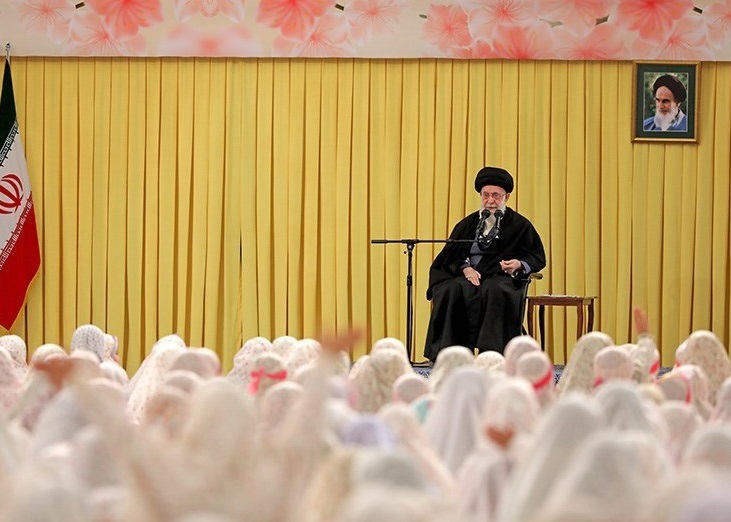Iranian Supreme Leader Ali Khamenei has reportedly pardoned thousands of prisoners this week. Some of those who were pardoned were involved in the ongoing anti-government protests.
Iranian state media IRNA reported on Sunday that Khamenei pardoned “tens of thousands” of prisoners, including some who were arrested in the ongoing protests. However, the pardons, which coincided with the anniversary of the 1979 Revolution, came with conditions and did not apply to several groups of prisoners.
The pardons do not apply to numerous dual nationals that are being detained in Iran, those who are convicted of “corruption on earth,” those charged for “spying for foreign agencies, having direct contact with foreign agents, committing intentional murder or perjury, committing destruction and arson of state property,” or those who are associated with “groups hostile to the Islamic Republic.”
“During recent events, a number of people especially young people, committed wrong actions and crimes as a result of the indoctrination and propaganda of the enemy,” said Iran’s judiciary head Mohseni Ejei in a letter to Khamenei requesting the pardons. “Since the foreign enemies and anti-revolutionary currents’ plans have been foiled, many of those youth now regret their actions.”
“Naturally, those who do not express regret for their activities and give a written commitment for not repeating those activities, will not be pardoned,” said deputy judiciary chief Sadeq Rahimi, according to state media.
The protests erupted in September last year following the death of Mahsa Amini in the custody of the morality police days after getting detained for allegedly flouting the Islamic Republic’s dress code for women. The Islamic Republic has sought to crack down on the protests, marking the biggest challenge to clerical rule since the 1979 Revolution, and has executed four people on protest-related charges. Tehran has also blamed its foreign adversaries for the protests.
Friday last week, Iranian Nobel Laureate Shirin Ebadi, who has expressed staunch support for the protests, said Amini’s death sparked a “revolutionary process” that is irreversible and would eventually lead to the Islamic Republic’s collapse.
In an interview by phone, Ebadi, who is based in London, said Tehran’s use of deadly violence against the demonstrators would only fuel the anger felt by ordinary Iranians about the clerical regime due to their grievances being left unaddressed.



 South Korea Assures U.S. on Trade Deal Commitments Amid Tariff Concerns
South Korea Assures U.S. on Trade Deal Commitments Amid Tariff Concerns  Trump Signs Executive Order Threatening 25% Tariffs on Countries Trading With Iran
Trump Signs Executive Order Threatening 25% Tariffs on Countries Trading With Iran  Iran–U.S. Nuclear Talks in Oman Face Major Hurdles Amid Rising Regional Tensions
Iran–U.S. Nuclear Talks in Oman Face Major Hurdles Amid Rising Regional Tensions  Jack Lang Resigns as Head of Arab World Institute Amid Epstein Controversy
Jack Lang Resigns as Head of Arab World Institute Amid Epstein Controversy  Nighttime Shelling Causes Serious Damage in Russia’s Belgorod Region Near Ukraine Border
Nighttime Shelling Causes Serious Damage in Russia’s Belgorod Region Near Ukraine Border  U.S. Announces Additional $6 Million in Humanitarian Aid to Cuba Amid Oil Sanctions and Fuel Shortages
U.S. Announces Additional $6 Million in Humanitarian Aid to Cuba Amid Oil Sanctions and Fuel Shortages  Trump Signs “America First Arms Transfer Strategy” to Prioritize U.S. Weapons Sales
Trump Signs “America First Arms Transfer Strategy” to Prioritize U.S. Weapons Sales  Trump’s Inflation Claims Clash With Voters’ Cost-of-Living Reality
Trump’s Inflation Claims Clash With Voters’ Cost-of-Living Reality  Netanyahu to Meet Trump in Washington as Iran Nuclear Talks Intensify
Netanyahu to Meet Trump in Washington as Iran Nuclear Talks Intensify  Trump Allegedly Sought Airport, Penn Station Renaming in Exchange for Hudson River Tunnel Funding
Trump Allegedly Sought Airport, Penn Station Renaming in Exchange for Hudson River Tunnel Funding  China Warns US Arms Sales to Taiwan Could Disrupt Trump’s Planned Visit
China Warns US Arms Sales to Taiwan Could Disrupt Trump’s Planned Visit  U.S. Lawmakers to Review Unredacted Jeffrey Epstein DOJ Files Starting Monday
U.S. Lawmakers to Review Unredacted Jeffrey Epstein DOJ Files Starting Monday  U.S.-India Trade Framework Signals Major Shift in Tariffs, Energy, and Supply Chains
U.S.-India Trade Framework Signals Major Shift in Tariffs, Energy, and Supply Chains  Japan Election 2026: Sanae Takaichi Poised for Landslide Win Despite Record Snowfall
Japan Election 2026: Sanae Takaichi Poised for Landslide Win Despite Record Snowfall  Missouri Judge Dismisses Lawsuit Challenging Starbucks’ Diversity and Inclusion Policies
Missouri Judge Dismisses Lawsuit Challenging Starbucks’ Diversity and Inclusion Policies  Pentagon Ends Military Education Programs With Harvard University
Pentagon Ends Military Education Programs With Harvard University 































